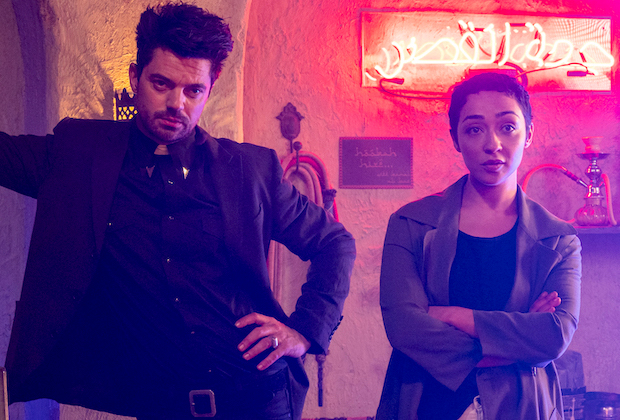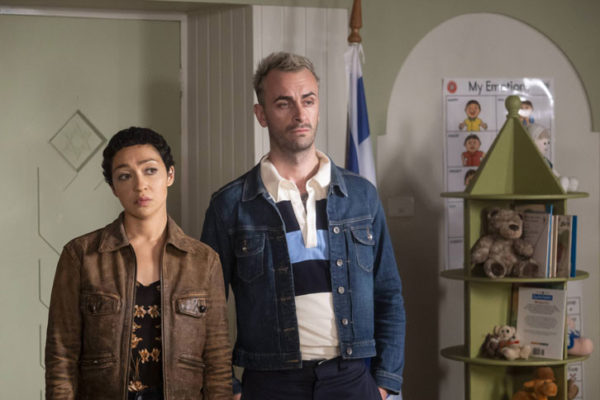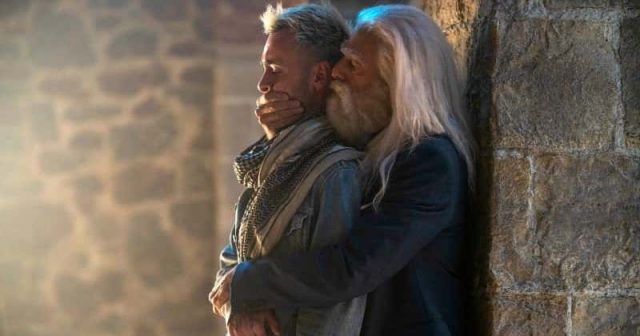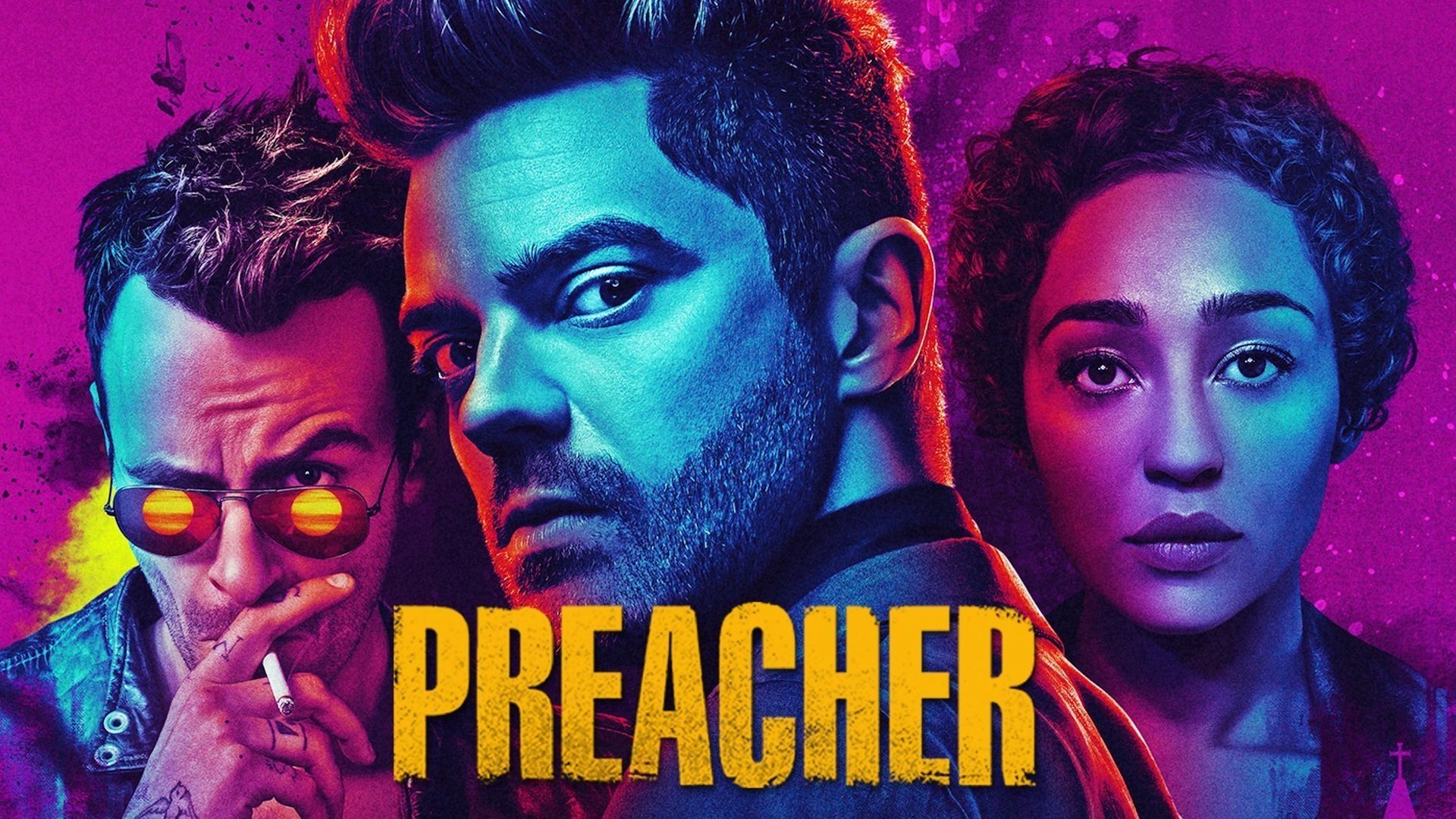NOTE: Spoilers from throughout the fourth and final season of, “Preacher” are present in this review
Preacher is a show so proudly ridiculous, so boldly absurd, and so unapologetically offensive, that it’s kind of a miracle that the series made it to four seasons! Originally inspired by the cult hit Vertigo/DC Comics graphic novel series of the same name, first published during the 90’s and concluding at the turn of the millennium, Preacher provided a welcome dose of devil-may-care levity to the otherwise brooding and edgy programming that’s most often popular at AMC. The show was never a ratings hit for the cable network, but it had a well-deserved following, not to mention tons of critical acclaim. After AMC announced in advance that Preacher would be concluding with its fourth season as well, the show was officially free to go for broke with its ludicrous, hyper-violent style, no longer having any reason to hold back in its last batch of ten episodes.
Preacher’s fourth and final season doesn’t ultimately manage to be the show’s best season, since it falls just shy of the especially superb third season that came before it last year, but if nothing else, it’s certainly the show’s most memorable season in many respects! Inevitably, there are some truly standout Preacher comic b0ok storylines that the show never ultimately explored, most notably Eugene Root’s eventual transformation into the psychotic Arseface, but as much as some of the source comics’ storylines, characters and carnage could never ultimately be brought to the show (likely because the AMC censors definitely would have stepped in with some of it!), the fourth and final season for the series is nonetheless a blast for the most part, coming as close to the unhinged sensibilities of the source comics that the show could ever possibly come on a semi-edited cable network like AMC.

This especially violent and destructive season immediately begins on an exciting note too, as Jesse and Tulip finally take the fight directly to the Grail, after they’ve captured Cassidy, and are more or less baiting the holder of Genesis to come to them at the Grail’s Middle-Eastern headquarters, Masada. Worse still is that the Grail is in active negotiations with the forces of Heaven and Hell alike to kickstart the apocalypse in 2020, completely decimating humanity so that God can create a new dominant species to succeed them. A continued assault on the Grail against such a tight clock would have been exciting enough, but the season also throws a curveball early on, when Jesse departs to Australia in order to undertake his own quest to save the world, even leaving Tulip and Cassidy behind in the process.
This means that Tulip and Cassidy were paired up for most of the season, while Jesse was separated from them, once again hunted by Eugene and the Saint of Killers. Truthfully, the most fun and engaging storylines of the season took place at the Grail’s headquarters in Masada, but it was often Jesse’s storylines wherein the narrative felt tightest and best executed. Seeing Jesse’s ever more challenging and twisted ‘tests’ at the hands of God provides lots of great comedy and drama in equal measure, eventually culminating with Jesse being forced to realize that God is a tyrant, one who doesn’t truly care about Jesse, his friends, or the world, and will never truly be pleased. Jesse even rejects ownership of Heaven due to his blind faith in God too, something that eventually motivates him to rejoin with his friends, and resume their old mission of kicking God’s ass, and saving humanity. This certainly leads to a memorable final struggle at Masada as well, one that eventually ends with Jesse wielding Genesis to defeat God once and for all, and prevent the foreshadowed apocalypse.

Of course, Tulip and Cassidy also play a big part in that, even if the show seems to have exhausted Cassidy’s best storylines in particular at this point. Instead, Cassidy often felt like a tag-along within several better Tulip-driven storylines, which unfortunately still sometimes merely had the two fruitlessly chasing Jesse, and not accomplishing much else, whenever they weren’t smacking around the Grail anyway. Tulip and Cassidy do eventually end up being the temporary caretakers of Humperdoo, the real Messiah though, whom Jesse ended up stashing with his and Tulip’s old criminal boss, go figure. This is just one element of the lengthy list of very naughty and politically incorrect story turns related to God and the Christ family during Preacher’s final season as well, which often also include Jesus and Hitler comically butting heads at Masada, and Jesus being routinely passed over as a soiled Messiah, after his illicit affair from over 2,000 years ago.
If there was one thing that really defined Preacher’s last season outside of its narrative however, it was the fact that the show could finally go all in on the exaggerated violence of the source comics, and boy did the show push the envelope here! Whether it was Cassidy getting repeatedly circumcised as a form of torture, God brutally crushing people against walls, the Saint of Killers blasting people to smithereens, or Herr Starr suffering no shortage of over-the-top painful humiliations throughout his own desires to please God, Preacher got violent and gory as hell in its final season, and that was great! The more experimental storytelling style during much of these last episodes didn’t always end up working out, especially when the show’s epilogue frustratingly delivered several undercooked, unsatisfying resolutions for characters like Eugene and Jesus, but fans of the Preacher comics will at least be happy to see the show being quite faithful to the ending of the original graphic novels, which had the Saint of Killers murdering God and succeeding Him on the throne of Heaven, after Jesse uses Genesis to force God on the run. Another time jump after this even shows Jesse and Tulip having died in their 80’s, and Cassidy committing suicide by walking into the sun immediately afterward, proving that these three lovably irreverent anti-heroes really did ride together until the very end.

Like I said, it’s kind of amazing that Preacher stayed on the air for as long as it did, and somehow didn’t elicit more controversy and protests, especially considering that Netflix’s (formerly FOX’s) competing religion-themed Vertigo/DC Comics series, Lucifer stirred up plenty of both, despite ironically being a much tamer show. Preacher is also the second Vertigo/DC show to end in 2019 to boot, following The CW’s iZombie finishing up its run during this past August. Whereas iZombie had really started to lose steam towards its end though, Preacher remained a delightfully wacky and darkly amusing show, right up to its conclusion. The show’s fourth and final season may have been a little more scattershot than the especially superb third season that preceded it, but Preacher still ultimately finished on a high note, delivering a satisfying mix of humour, drama, religious satire, character and world building, and no shortage of over-the-top violence in its last episodes. I’ll really miss this series, but damn was it fun while it lasted!

